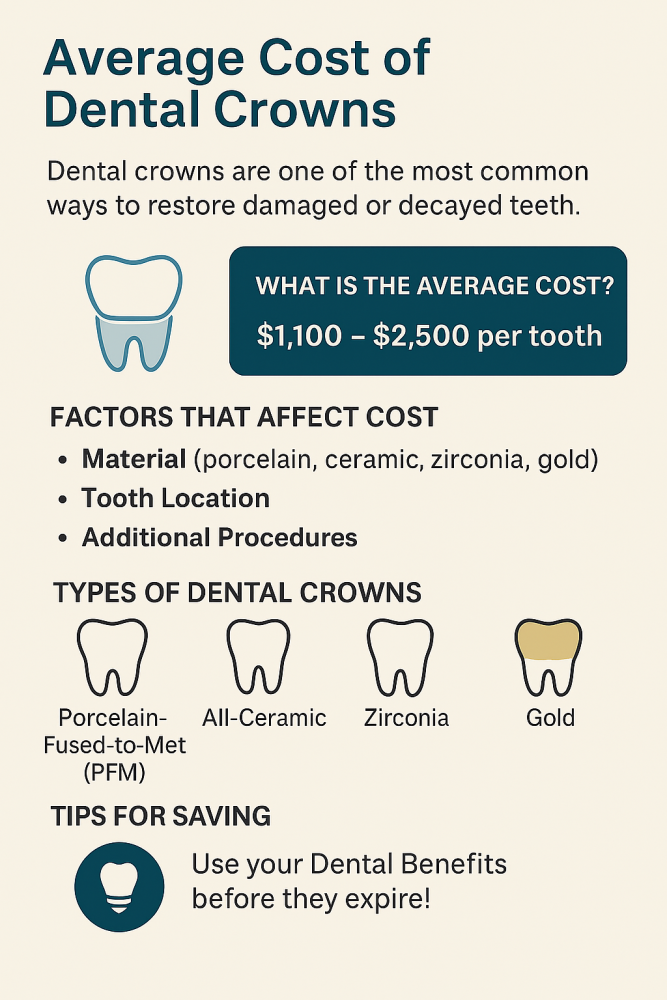Average Cost of Dental Crowns: What You Need to Know
Written by Dr. Jesse Hofer, DMD April 3, 2025 18:52
When it comes to restoring your smile, dental crowns are one of the most common (and effective) options out there. But if you're wondering about pricing, you're definitely not alone—it’s one of the first questions we hear from patients at our Oyster Bay office.
So how much do dental crowns actually cost? And what factors can make one crown more expensive than another?
We’re going to break it all down for you—without the dental jargon. Whether you’re budgeting for a single crown or just want to understand your options, we’ll help you make a confident, informed decision.
✨ If you’re exploring affordable dental crown options, take a look at Precision Oyster Bay’s cosmetic dentistry services—or give us a call at 516-922-5730. We’re here to walk you through it, answer your questions, and make your smile restoration as stress-free as possible.
What Is the Average Cost of a Dental Crown?
Let’s get straight to the numbers. The average cost of a dental crown in the U.S. typically falls between $1,100 and $2,500 per tooth. The exact number depends on a few things—like the crown material, how complex the work is, and whether your insurance is chipping in.

Here in Oyster Bay, we see most crown treatments fall in the $1,200–$1,800 range, depending on the type and how much prep the tooth needs.
Now, we know that kind of price tag can feel intimidating. But dental crowns are more than just a cosmetic fix—they’re a durable, long-term investment in your oral health. In most cases, they last 10 to 15 years (and often even longer with good care).
Factors That Affect the Cost of Dental Crowns
We believe in being transparent with our patients, especially when it comes to cost. So what exactly impacts the average cost of a dental crown?
Here are the biggest factors:
- Material Used: Porcelain, ceramic, zirconia, and gold all vary in cost and durability.
- Tooth Location: Molars (which handle heavy chewing) often need stronger materials and more prep.
- Additional Procedures: If your tooth needs a root canal, build-up, or prep before the crown, that adds to the total.
- Lab vs. Same-Day: Custom lab-crafted crowns may cost more but offer incredible precision. Same-day crowns are convenient but may have different pricing.
- Insurance Coverage: Some plans cover a portion of the procedure (we’ll go into more detail below).
At Precision Oyster Bay, we’ll walk you through your options and always provide an upfront estimate—no surprises, no pressure.
Types of Dental Crowns and Their Price Differences
You’ve got options. And each one comes with its own cost range and pros/cons.

Here’s a quick breakdown of what you might choose:
- Porcelain-Fused-to-Metal (PFM): Durable and less expensive than all-porcelain; ~$1,100–$1,400.
- All-Ceramic or All-Porcelain: Great for front teeth—very natural-looking. ~$1,300–$1,800.
- Zirconia: Extremely strong, ideal for molars; also tooth-colored. ~$1,500–$2,000.
- Gold Crowns: Long-lasting and strong, though not as popular aesthetically. ~$1,200–$2,500.
Not sure what’s best for your smile? You don’t need to figure it out alone. We’ll help you choose a crown that fits your budget, your bite, and your long-term dental goals.
Is Dental Insurance Coverage Available for Crowns?
Short answer: Sometimes.
Many dental insurance plans cover crowns partially, especially if they’re deemed medically necessary (say, after a large filling or root canal). On average, coverage is around 50%, though every plan is different.
The best way to find out? Let us help. Our team will review your plan, explain your benefits in plain language, and even handle the insurance paperwork so you don’t have to.
And if you’re not using insurance? We offer flexible payment options and financing plans that keep care affordable—because no one should delay treatment due to cost.
What to Expect During the Dental Crown Procedure
A lot of patients come in feeling nervous about what a crown involves—but it’s much more comfortable and straightforward than most expect.
Here’s what the process usually looks like at our Oyster Bay office:
- Consultation & Exam – We take a close look at the tooth and walk you through your crown options.
- Tooth Prep – The tooth is gently reshaped to make room for the crown. If needed, we may build it up first.
- Impression or Digital Scan – We capture the exact shape of your tooth to ensure a snug, natural fit.
- Temporary Crown – You’ll leave with a temporary crown to protect the area.
- Permanent Crown Placement – In about 1–2 weeks, your custom crown is ready. We cement it securely and check the fit and bite.
We take the time to make sure it looks and feels right—because comfort and confidence go hand in hand.
How to Save on the Cost of a Dental Crown
If you're concerned about the cost, you’re not alone—and there are ways to keep treatment affordable without sacrificing quality.
💡 Here’s what we recommend:
- Use your dental benefits before they expire—most reset annually!
- Ask about in-house financing—we offer plans that break treatment into manageable monthly payments.
- Consider alternative materials—we’ll explain cost differences and help you choose what’s best for your needs.
- Address problems early—treating a cavity is cheaper than a root canal and crown down the line.
We’ve worked with patients across all budget levels, and we’ll always meet you where you are.
Alternatives to Dental Crowns and Their Costs
Crowns are often the best long-term solution for damaged or weak teeth—but depending on your specific situation, there might be alternatives.
- Dental Bonding: Good for minor chips or cracks. ~$300–$600 per tooth.
- Onlays/Inlays: Less invasive than full crowns. ~$650–$1,200.
- Veneers: Cosmetic option, often used on front teeth. ~$1,000–$2,500 per tooth.
- Extraction + Implant: If a tooth can’t be saved, this might be the route—but it’s more expensive and time-intensive.
We’ll never push treatment you don’t need. Instead, we’ll talk you through the pros, cons, and what will work best for you—based on your goals, your smile, and your budget.
Let’s Talk About Your Smile Goals
At Precision Oyster Bay, every smile has a story—and we’re here to help you protect and restore yours with care that’s honest, compassionate, and personalized. Whether you’re dealing with a broken tooth, considering a cosmetic upgrade, or just need answers about crowns and costs, we’re here to help.
📞 Ready to take the next step? Call us at 516-922-5730 or contact us here to learn more. We’d love to get to know you and help you feel great about your smile again.
FAQs
How long do dental crowns last?
With good care, most crowns last 10–15 years—and many go well beyond that.
Are crowns painful to get?
The procedure is generally painless, thanks to local anesthesia. You may feel mild soreness after, but it fades quickly.
What’s the difference between a crown and a filling?
Fillings repair small areas of decay; crowns cover the entire tooth to restore strength and structure.
Can I eat normally with a crown?
Yes! Once your permanent crown is placed, you can eat all your favorites again—just be gentle with hard, sticky foods.
Bibliography
- Jordan Rosenfeld, “How Much Do Dental Crowns Cost? Pricing and Insurance Guide,” carecredit.com, November 15, 2024,https://www.carecredit.com/well-u/health-wellness/dental-crown-cost-dental-crown-financing/
- Sheila Miller Edwards, “How Much Does a Dental Crown Cost? Average Prices With and Without Insurance,” goodrx.com, September 3, 2024,https://www.goodrx.com/conditions/dental-care/dental-crown-cost
- “Dental Crowns: Preserving Damaged Teeth,” yourdentistryguide.com,https://www.yourdentistryguide.com/crowns/
- “Dental Crown To Replace Teeth: Costs, Materials, Types, and More,” dentaly.org, November 13, 2024,https://www.dentaly.org/us/dental-crown-information/
- “Dental crowns: costs and coverage,” humana.com,https://www.humana.com/dental-insurance/dental-resources/dental-crown-costs-coverage